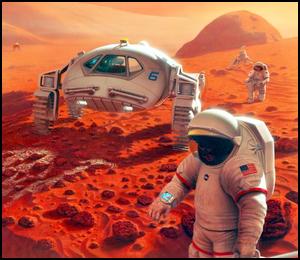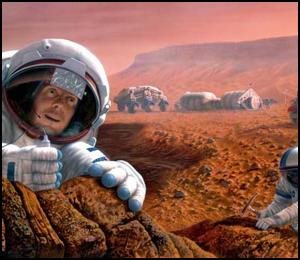By Gail Jacobs
 Dr. Margaret Race is concerned with protecting the planets - not just Earth, but Mars and beyond. Her work focuses on ensuring that missions to the Red Planet and other solar system bodies do not inadvertently bring terrestrial microbes along (which would complicate our search for indigenous extraterrestrial life) or return any microbes to Earth (which might be biohazardous). Her research on extraterrestrial organisms is linked closely to her long-time ecological interest in exotic and invasive species on Earth.
Dr. Margaret Race is concerned with protecting the planets - not just Earth, but Mars and beyond. Her work focuses on ensuring that missions to the Red Planet and other solar system bodies do not inadvertently bring terrestrial microbes along (which would complicate our search for indigenous extraterrestrial life) or return any microbes to Earth (which might be biohazardous). Her research on extraterrestrial organisms is linked closely to her long-time ecological interest in exotic and invasive species on Earth.
Margaret is also actively involved in education on astrobiology and especially likes to work with journalists and educators to develop materials about complex, controversial issues in space exploration and environmental protection. Her enthusiasm is infectious, and her work ensures that our spacecraft are not.
Margaret, explain "Planetary Protection" for us.
Planetary protection applies to biological cross-contamination of planets during space missions. The Outer Space Treaty of 1967 requires space exploration be done in ways that avoid forward contamination (transporting hitchhiker microorganisms from Earth on outbound spacecraft) and back contamination (bringing something back that could be biohazardous to Earth). It doesn't mean we're scared of discovering ET life or that it's like the Andromeda Strain. Being careful is just a good, conservative, scientific process; and it also helps preserve and protect samples in ways that make them maximally useful to scientists.
The international Committee on Space Research (COSPAR) provides a forum for discussions of problems that may affect space research, including planetary protection. More than 90 countries have signed the Outer Space Treaty so any country that launches spacecraft must adhere to those rules. Early discussions about planetary protection actually began around the time of Sputnik, when scientists realized that by launching craft from Earth, we could transport hitchhiker organisms to other places. If we're going to search for life beyond Earth, the last thing we want to do is bring it with us. Not many people are aware that we were concerned about environments off this planet even before we enacted some of our own environmental laws.

What is your involvement in planetary protection?
I am a policy analyst and ecologist. My work at the SETI Institute is supported by a grant from NASA's Office of Planetary Protection. I also serve as a communication bridge. I don't answer the questions; I ask them and examine what kind of science and information we need to address them, especially for Environmental Impact Statements. I put the pieces together by soliciting advice and opinions from experts all over the world. As new discoveries are made, such as finding evidence for water on Mars, we need to discuss on an international level whether our existing planetary protection requirements and controls are sufficient. The regulations have been updated many times since 1967, just as the Clean Air and Clean Water Acts get updated.
In addition to analyzing the legal and policy aspects of missions, I've also studied biocontainment and life detection, as well as ethical issues and how they apply to missions. I help determine the best ways to communicate about planetary protection to the public. NASA is committed to informing the public about any and all risks prior to launch and to assuring the public that significant oversight and monitoring are done at all times.
Scientific discussions touch many issues when NASA considers how clean a spacecraft must be -- or how international policies should apply to Mars versus a newly discovered moon like Enceladus, for example. The Treaty says to avoid harmful cross-contamination but it's not simple to determine what that means. It takes scientific studies to determine what is harmful and how clean is clean enough for a spacecraft. We draw from the same biological principles that are used on Earth, considering what type of environmental impact we might create when we move things between planets.
Are there other comparisons between protecting the Earth and outer space?
Definitely yes! In fact, this past year I've looked at the Antarctic Treaty. There are three major areas considered "resources for humankind," to be held in trust for future generations and protected from exploitation by individual nations or corporations. Those resources are the deep oceans, outer space, and Antarctica. By international agreements, we've declared that nobody owns them, no one can plant flags or declare sovereignty, there can be no militarization or nuclearization, and there is high priority given to science, cooperation, and benefits for humankind.
Antarctica was set aside for science and explorers, yet tourist ships are now arriving full of people who want extreme vacations. How do you manage the throngs of visitors while still preserving the environment? In a similar way, we're beginning to think about the space environment. How should we manage the growing desire for space tourism? Or what if someone wants to go to the moon and strip mine it for resources? What regulations would apply? Who would issue the permits? It's important to think about how different activities could affect science and exploration. It's also critical to figure out who should be involved in these discussions besides scientists---- maybe lawyers, ethicists, political scientists, and other disciplines. Lately we've been thinking how to bring them all together for discussions on how to proceed.

What if life is discovered somewhere in outer space?
If we were to find life beyond Earth, it would be a huge discovery! The first question will be whether it is microbial or intelligent life and what characteristics it has. Scientifically, we could tell you how significant it is. However, no amount of science is able to tell us what it would mean to us as humans to know we're not alone? Do the views about ET life differ between various cultures, political groups, or religions? How do we take that information and use it? Will that knowledge change us? And what does it say about life in the long run?
All our laws, ethical systems, and religions are based on life as we know it. But what if we find life as we don't know it? What will that mean and how does that change everything on Earth - or not? That is why it's important to bring other disciplines in to think about these questions - and to talk about how we might balance those many different perspectives. I find that fascinating!
What is your biggest challenge?
Overall, I think it's important to convince people that it's not frivolous to think about these topics. It's different than thinking about little green men. What we've learned about astrobiology, extremophile biology and habitability has given us a lot of information about how human beings work, how ecological systems work, and how our planet works.
What do you enjoy most about your job?
I love the multidisciplinary nature of my job, and I enjoy the fact that I get to work with such a diverse group of really smart people. I tell people, "I'm not a rocket scientist but I get to work with them!" My job has grown into something beyond space missions; it has expanded to include astrobiology and questions about life itself. Are we alone in this universe? Does Earth contain the only examples of life -- or not, and what does that all mean?
I also really enjoy talking with the public and going into classrooms and museums. I emphasize I'm not an astronomer; I'm a biologist, and a Mom. When I was a student, my current job didn't exist. This demonstrates to a young audience that they will be faced with opportunities throughout their lives they can't even imagine right now. The best way to position themselves is to become fully educated across multiple areas. I get to "play" in so many areas! I go from cell biology to physiology, to astronauts' health and safety, and to legal, policy and ethical aspects of astrobiology. When I started out, I certainly didn't think that is what I wanted to do, but I like taking all these areas and blending them with up-to-date science.
What is your philosophy of life?
Lifelong learning. Never stop learning!
If you had the time, what would you still like to learn?
Are we alone?
What's in store for you in the future?
In terms of my work with the SETI Institute, I hope to continue my work on astrobiology, planetary protection, and societal issues. Last year I organized an interdisciplinary workshop to see if we could build a "roadmap" of Astrobiology and Societal Issues -- there was a resounding yes! We're continuing to work on the framework outlining priority areas of research ahead.
But the effort will take more than scientists - we aim to include a global consortium of lawyers, political scientists, theologians, ethicists, philosophers, anthropologists, sociologists, psychologists, artists, historians, engineers, and more. We plan to gather multidisciplinary information, pull together a database of literature, and then organize sessions on Astrobiology and at non-science conferences. It will be really interesting to see what new and thought-provoking research areas arise.
Learn more about Margaret and her fascinating career in her full interview.